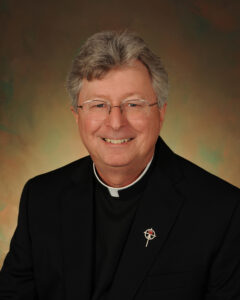By Fr. Joe Nassal, C.PP.S.
The parable Jesus tells in this Sunday’s gospel (Luke 18, 1-8) about the widow and the unjust judge is unsettling because it gives the impression that if we just badger God long enough, God will give in to our prayer as the judge finally does to the persistent widow. This is not the image of God or practice of prayer that I care to embrace.
It seems to suggest that prayer will produce results if we only try harder, pray harder. This is prayer as a consumer in the marketplace of God’s mercy. Be persistent and everything will be okay because God will wear down or be annoyed enough to give in to our petitions.
But if one views this parable from the perspective of the widow, it becomes a story about more than perseverance. Remember, in Jesus’ time the widow was an outcast, a fringe player in the system. She had no voice. No one would listen to her. No one paid attention because she didn’t count. She held no power, no status.
When one views this parable through the lens of the widow, this parable is about finding one’s voice. Then being persistent until the walls of injustice come tumbling down.
Jesus tells this parable in the context of reminding his disciples “to pray always and never lose heart.” Just before this in Luke’s Gospel, Jesus offers a rather harrowing description of the end times, of what the disciples can expect from remaining faithful to the Gospel. They will experience unspeakable pain and sorrow, but he tells them not to allow these sufferings, trials, and tribulations to diminish their commitment, defer their hope, or damage their faith. Call out to God, day and night in prayer, Jesus tells them, and trust that God is there.
As a wise old friend once reminded me when confronted with my impatience with God, “God will respond in God’s time and God is always on time.”
For some, prayer is the last resort. When we have exhausted all our resources, ideas and imagination to solve a dilemma or fix a problem, we may turn to prayer. While giving a parish retreat years ago, I visited a woman who was very ill but had given up on faith and on God a long time before. Her sister who was coming to the retreat requested that I visit. The sick woman welcomed me. After an engaging conversation, I asked her if she would mind if I pray with her. She shrugged and said, “I guess it couldn’t hurt.”
“I promise it won’t hurt,” I said. “Who knows, it may even help.”
Jesus advises us to keep praying even when the answer to our prayer seems elusive and out of reach. In those times of great loneliness and sadness as we teeter on the brink of despair, we turn to prayer. When someone we love is sick, or broken, or feeling betrayed and asks us to remember them, we hold them in prayer.
This attitude of perseverance is not only for our personal prayer but for our communal prayer. How often do we find our hearts growing weary because we hold all the weak and wounded, the sick and suffering, the pain and problems of so many in our prayerful hearts? But then, as Aaron and Hur did for Moses in the first reading, someone in the parish or in the family or in the community comes along and says, “I will hold your intentions in my prayer” to give us courage, to give us hope, to help us feel less alone.
So, though the answers sometimes seem elusive, may we persevere in prayer. And as I often say at the end of a retreat, until we meet again in person, may we meet often in prayer and linger there awhile.
![]()

Fr. Joe Nassal, C.PP.S., a noted author, preacher and retreat leader, also serves as vice provincial director of the United States Province.

